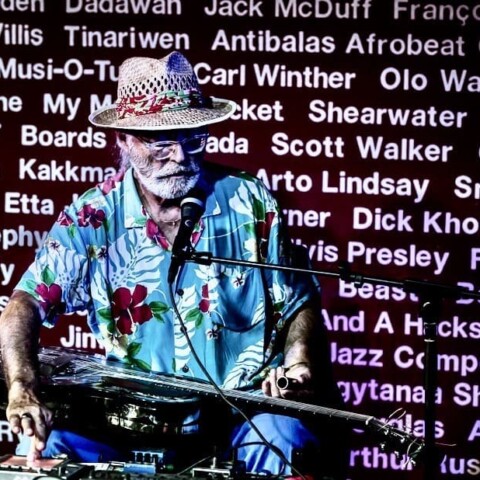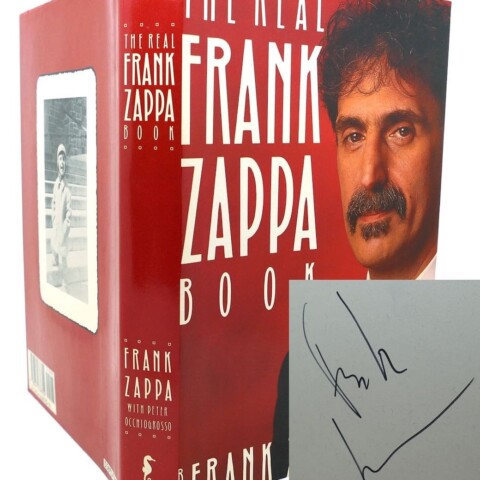Grandpaw Steel remembers what it was really like back in the day… I SELDOM PUT my thinking cap on – heck, what even is a thinking cap – about the past, but sometimes nostalgia just jumps up and bites you in the scrotum.  I’ve been reading Jeff Tamarkin’s 2003 biography of Jefferson Airplane. (Yes, folks, there’s still a stack of them on sale at Real Groovy). He’s not the most insightful writer, but it’s useful to read a detailed narrative about the halcyon trip – ha-ha! – of the band many think of as synonymous with San Francisco during its acid-laced, psychedelic ‘summer of love’. Personally, I wanted to find out how one of the best bands of the ‘60s (Jefferson Airplane) metamorphosed into one of the worst bands of the ‘70s (Jefferson Starship), a question that has periodically bugged me from youth through to my slow decline to middle age.
I’ve been reading Jeff Tamarkin’s 2003 biography of Jefferson Airplane. (Yes, folks, there’s still a stack of them on sale at Real Groovy). He’s not the most insightful writer, but it’s useful to read a detailed narrative about the halcyon trip – ha-ha! – of the band many think of as synonymous with San Francisco during its acid-laced, psychedelic ‘summer of love’. Personally, I wanted to find out how one of the best bands of the ‘60s (Jefferson Airplane) metamorphosed into one of the worst bands of the ‘70s (Jefferson Starship), a question that has periodically bugged me from youth through to my slow decline to middle age.  It always felt to me that the arena-sized anthems of Jefferson Stardom totally fucked any chance Jefferson Airplane ever had to attain the kind of perpetual status they deserved as San Francisco’s psychedelic innovators. It’s easy to find flaws in Jefferson Airplane’s work, but also great strengths, and it’s sad that they have become entombed by their two big hits, ‘Somebody To Love’ and ‘White Rabbit’, and not so well acknowledged for having helped establish the notion of the long playing rock record as something more than a collection of singles and b-sides. It’s also seldom acknowledge just how connected they were to many of the other major players in ‘60s rock; not just the SF and LA contingent, but also players like Hendrix. JA’s Jack Casady – one of the most distinctive bassists of the era – even got to perform with Hendrix, and play on his Electric Ladyland album.
It always felt to me that the arena-sized anthems of Jefferson Stardom totally fucked any chance Jefferson Airplane ever had to attain the kind of perpetual status they deserved as San Francisco’s psychedelic innovators. It’s easy to find flaws in Jefferson Airplane’s work, but also great strengths, and it’s sad that they have become entombed by their two big hits, ‘Somebody To Love’ and ‘White Rabbit’, and not so well acknowledged for having helped establish the notion of the long playing rock record as something more than a collection of singles and b-sides. It’s also seldom acknowledge just how connected they were to many of the other major players in ‘60s rock; not just the SF and LA contingent, but also players like Hendrix. JA’s Jack Casady – one of the most distinctive bassists of the era – even got to perform with Hendrix, and play on his Electric Ladyland album.
 In 1974 I was still a spotty adolescent marooned in Hamilton, where the local record shop had but one wee swivel display of imported items. By this time a huge fan of American magazine Creem (and writers like Robert Christgau and Lester Bangs), I would carefully scan the classified ads in the back for interesting-looking mailorder companies. The two that stuck were called Moby Disc and Dirty Jacks. I never found out who this dirty Jack was, but as a mailorder firm specialising in ‘cut outs’ (deletions) that went for as little as 99 cents per item, I was sold. From that point on, much of my pocket money would go towards Dirty Jacks items, which invariably took three or four months to arrive, and when they did, I’d get a call from Hamilton Customs, who would interrogate me in person about why on earth I was getting a package from a company with a name like that.
In 1974 I was still a spotty adolescent marooned in Hamilton, where the local record shop had but one wee swivel display of imported items. By this time a huge fan of American magazine Creem (and writers like Robert Christgau and Lester Bangs), I would carefully scan the classified ads in the back for interesting-looking mailorder companies. The two that stuck were called Moby Disc and Dirty Jacks. I never found out who this dirty Jack was, but as a mailorder firm specialising in ‘cut outs’ (deletions) that went for as little as 99 cents per item, I was sold. From that point on, much of my pocket money would go towards Dirty Jacks items, which invariably took three or four months to arrive, and when they did, I’d get a call from Hamilton Customs, who would interrogate me in person about why on earth I was getting a package from a company with a name like that.  I’m pretty sure that I paid full price for Volunteers, thinking that somehow, miraculously, I would be able to play four-way (quadrophonic) music on the family radiogram or my older brother’s two-and-a-half watt Oriana stereo. But when it arrived, it was so warped I couldn’t play it. Because all albums came via surface mail, they crossed the equator by boat, and they were all a little bit buckled, but this one, pressed on thin RCA vinyl, sent the needle into orbit. The solution? The album spent more than a year under some very heavy family furniture, before joining its flatter brothers and sisters on the rack. I can report that today, nearly 40 years later, there’s no discernable warp at all. But what of the album itself? Well, by the time I got to listen to it, I was mildly disappointed. Unlike the earlier JA albums, most of Volunteers sounded neither hungry nor tight, and it was infused with a relaxed, almost country feel in places, acknowledging the influence of contributors like David Crosby and Stephen Stills, and members of the Grateful Dead. The quadrophonic mix didn’t help, making it sound nice and translucent but lacking in bite.
I’m pretty sure that I paid full price for Volunteers, thinking that somehow, miraculously, I would be able to play four-way (quadrophonic) music on the family radiogram or my older brother’s two-and-a-half watt Oriana stereo. But when it arrived, it was so warped I couldn’t play it. Because all albums came via surface mail, they crossed the equator by boat, and they were all a little bit buckled, but this one, pressed on thin RCA vinyl, sent the needle into orbit. The solution? The album spent more than a year under some very heavy family furniture, before joining its flatter brothers and sisters on the rack. I can report that today, nearly 40 years later, there’s no discernable warp at all. But what of the album itself? Well, by the time I got to listen to it, I was mildly disappointed. Unlike the earlier JA albums, most of Volunteers sounded neither hungry nor tight, and it was infused with a relaxed, almost country feel in places, acknowledging the influence of contributors like David Crosby and Stephen Stills, and members of the Grateful Dead. The quadrophonic mix didn’t help, making it sound nice and translucent but lacking in bite.  The album did have two songs, however, that totally knocked me out. In these pre-hip-hop times naughty words in rock music were still commonly censored and very, very rare – even in ’74 – so I was shocked that ‘Hey Frederick’ and the ‘We Can Be Together’ both not only contained naughty words, but in their subject matter, were quite contentious. The former was a very unusual piano-based eulogy for the earth in which humans were made to feel very small indeed. Our lives were incredibly short and inconsequential, and, according to the acerbic Grace, didn’t “mean shit to a tree.” ‘We Can Be Together’ was even better, a genuine anthem of the times preaching revolution, and even sounding a little bit punk: “We are all outlaws in the eyes of America/In order to survive we steal cheat lie forge fuck hide and deal/We are obscene lawless hideous dangerous dirty violent and young… All your private property is/Target for your enemy/And your enemy is/We/We are forces of chaos and anarchy/Everything they say we are we are…” Etc. And then it got to the chorus: “Up against the wall motherfucker/Tear down the walls…” Apparently, it wasn’t the first time the word ‘motherfucker’ had made it to vinyl – that was the soundtrack to the hippy musical Hair. It was the second time the word had made it to vinyl. As a whole though, Volunteers was underwhelming in comparison to the group’s most outstanding work: the triumvirate of Surrealistic Pillow, After Bathing At Baxter’s and Crown Of Creation. And anyway, by ’74 I had already graduated to Mike Oldfield, Gong, Henry Cow and Frank Zappa. It would be awhile before the clock could be turned back. GARY STEEL
The album did have two songs, however, that totally knocked me out. In these pre-hip-hop times naughty words in rock music were still commonly censored and very, very rare – even in ’74 – so I was shocked that ‘Hey Frederick’ and the ‘We Can Be Together’ both not only contained naughty words, but in their subject matter, were quite contentious. The former was a very unusual piano-based eulogy for the earth in which humans were made to feel very small indeed. Our lives were incredibly short and inconsequential, and, according to the acerbic Grace, didn’t “mean shit to a tree.” ‘We Can Be Together’ was even better, a genuine anthem of the times preaching revolution, and even sounding a little bit punk: “We are all outlaws in the eyes of America/In order to survive we steal cheat lie forge fuck hide and deal/We are obscene lawless hideous dangerous dirty violent and young… All your private property is/Target for your enemy/And your enemy is/We/We are forces of chaos and anarchy/Everything they say we are we are…” Etc. And then it got to the chorus: “Up against the wall motherfucker/Tear down the walls…” Apparently, it wasn’t the first time the word ‘motherfucker’ had made it to vinyl – that was the soundtrack to the hippy musical Hair. It was the second time the word had made it to vinyl. As a whole though, Volunteers was underwhelming in comparison to the group’s most outstanding work: the triumvirate of Surrealistic Pillow, After Bathing At Baxter’s and Crown Of Creation. And anyway, by ’74 I had already graduated to Mike Oldfield, Gong, Henry Cow and Frank Zappa. It would be awhile before the clock could be turned back. GARY STEEL















